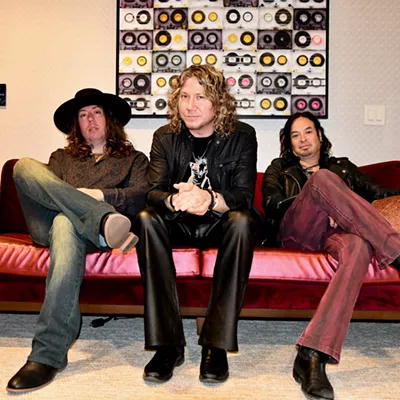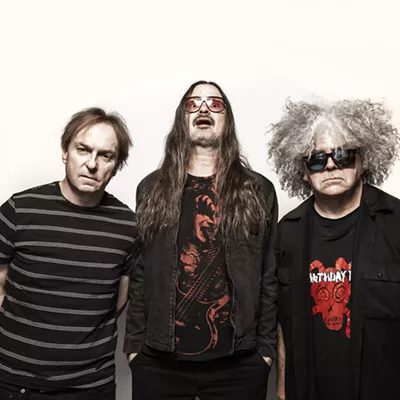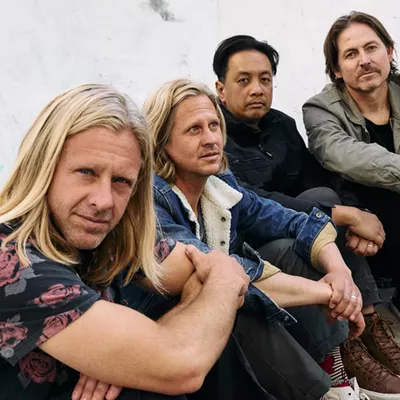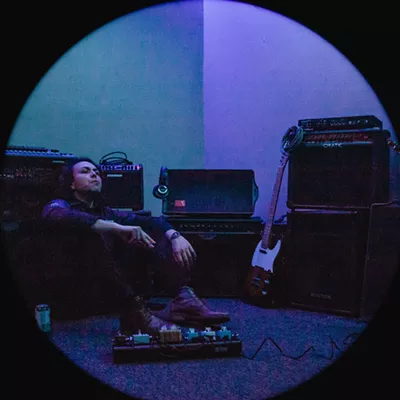Maal will bring his 12-piece backing band to Tucson for a performance Tuesday, April 20, at the University of Arizona's Centennial Hall. The concert is part of the UA Office of Cultural Affairs' celebrated UApresents series.
Although not from Senegal's traditional griot caste--Maal comes from the country's impoverished minority and was raised in the Fulani Muslim faith--he pursued a career in music with the blessings of his working-class parents. His father was a field laborer who had the role of singing to summon worshippers to the mosque. His mother was a songwriter who took it upon herself to teach him the traditional musical forms.
Born in 1953, Maal grew up exposed to American soul performers such as James Brown, Otis Redding, Wilson Picket and Etta James, as well as to the heady mélange of music that sprang up in Caribbean islands like Jamaica, especially the socially conscious reggae played by Bob Marley, Toots Hibbert and Jimmy Cliff.
As a teenager, he studied in the capital city of Dakar, where he was a member of the regional 70-piece touring orchestra Asly Fouta. By 1982, Maal was studying music theory and composition at the Conservatoire des Beaux Arts, where he met and started performing with longtime friend and mentor Mansour Seck.
The duo was popular for a number of years throughout Europe. When the legendary English DJ John Peel first heard their album Djam Leelii, he was impressed by its authentic, visceral power. Peel likened the experience to "listening to Muddy Waters for the first time."
That album, re-issued in 1989, drew from traditional songs of fishermen, chants of ancient warriors and weaving tunes. Most notably, its musical framework was based on the Yela songs of indigenous women pounding grain, which Maal's mother taught to him when he was a child.
Upon returning to Senegal, Maal formed his current group, Daande Lenol, which means "Voice of the People." In 1985, he signed to the Paris-based label Syllart, releasing the acclaimed albums Wango and Taara.
By 1991, Maal had moved to the Island Records subsidiary, Mango, which helped bring him to the attention of the growing world music community. He made a traditional acoustic album, Baayo, before adding synthesizers and electronic percussion for Lam Toro, which eventually got the remix treatment. Firin' In Fouta introduced free jazz and reggae to the mix.
Nomad Soul, released in 1998, featured guest vocalists such as Sinéad O'Connor and hotshot producers such as Brian Eno and Howie B. The Live at Royal Festival Hall EP followed in 1999. He returned to his acoustic roots with his most recent album, 2001's Missing You (Mi Yeewnii), which is focused on the rich musical heritage of West Africa.
Baaba Maal also is an outspoken activist and community leader. He speaks regularly about HIV/AIDS awareness as a youth emissary for the United Nations Development Program. He has appeared on the AIDS awareness compilation albums Red, Hot and Rhapsody and Red, Hot and Riot, tributes to the music of George Gershwin and Fela Kuti, respectively.
When Michael Stipe, of the rock band R.E.M., heard this man sing, he was moved to declare, "Baaba Maal opened his mouth, and beautiful pearls and lilies and songbirds came flying out."






